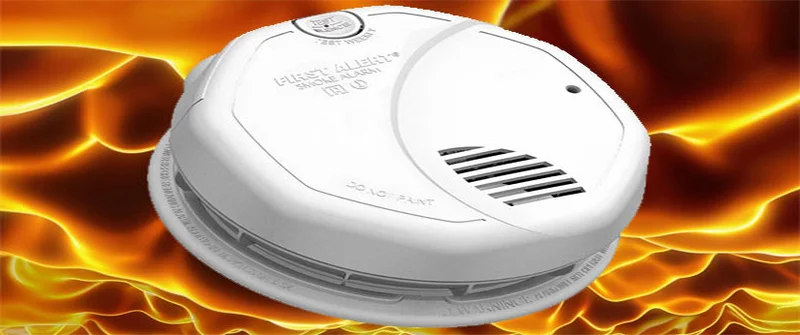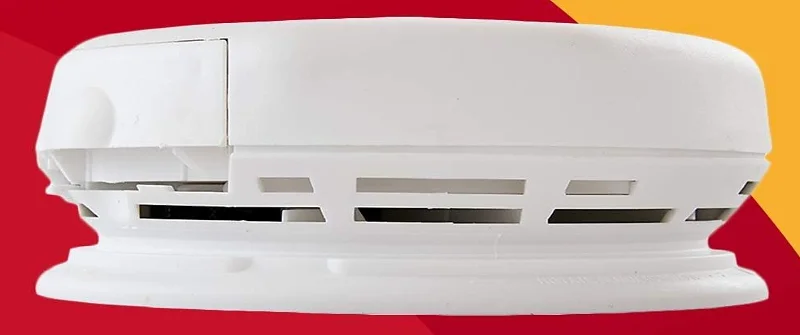Do Smoke Detectors Expire – Yes – Shelf Life

It’s a common question. “Do smoke detectors expire?” Yes, over time they lose sensitivity. Here’s what you need to know…
The smoke detector works in the background, mounted on ceilings or walls while it constantly and continuously measures the air around it – just waiting to alarm. It works hours, days, weeks, months, years – never ending. HOWEVER, eventually at least until one of two things will happen…
1. The batteries go dead (the dreaded ‘chirp’ sound).
2. It degrades – the smoke detector expires – due to its effective shelf life.
Smoke Detector Expires – Shelf Life
The U.S. Fire Administration says most smoke detectors installed today have a life span of about 8-10 years. After this time, the entire unit should be replaced.
One of the Best Dual Sensor Smoke Alarms
The following smoke alarms are what I have installed in my own home. I have several of the AC-powered (hardwired) units (which also have backup batteries) and I have also added several battery-powered smoke alarms in other locations.

When you purchase through links on my site, I may earn an affiliate commission at no extra cost to you.(Learn More).
Dual-Sensor >> Battery Powered
(mount anywhere – view on amzn)
Dual-Sensor >> AC-powered (hardwired) with Battery Backup
[ Read: Dual Sensor Smoke and Fire Alarm, and Why They Are The Best ]
Tip: A good habit: Replace smoke detector batteries during a notable time of the year such as the New Year, January 1. Or, when you change the clocks every year (e.g. Daylight Savings Time).
My husband just keeps delaying the installation of new batteries; despite the fact that I buy them, leave them out, and remind him.
~ Commenter
He seems to prefer getting awakened in the middle of the night to respond to the incessant chirping.
Tip: Write the date of purchase with a marker on the inside of your smoke detector (battery compartment) so you will know when to replace it. Some of the newer detectors already have the purchase date written inside.
Why Do Smoke Detectors Expire?
UPDATE 1
Someone asked why there’s a 10-year shelf life when an ionization smoke detector’s “Americium 241” has a half-life of over 400 years. Good question.
The NFPA recommendation may have to do with the degradation of the electronic component sensors aging and/or the reliability thereof. Also, a dual-sensor smoke alarm includes a photoelectric sensor that may be degraded over time.
UPDATE 2
“It is the sensors that fail after a given amount of time, not so much the electronic circuitry or the radioactive ionization source. The sensor modules rely on an electro-chemical reaction to smoke/CO, they get saturated over time depending on exposure and just start breaking down.”
About Smoke Detectors – Ionization vs Photoelectric vs Dual Sensor
There are many different brands of smoke alarms available on the market but they fall under two basic types: ionization and photoelectric.
IONIZATION alarms sound more quickly when a flaming, fast-moving fire occurs.
PHOTOELECTRIC alarms are quicker at sensing smoldering, smoky fires.
DUAL SENSOR alarms combine ionization AND photoelectric into one unit (recommended).
Because both ionization and photoelectric smoke alarms are better at detecting distinctly different yet potentially fatal fires, and because homeowners cannot predict what type of fire might start in a home, you might consider installation of both ionization and photoelectric or dual sensor smoke alarms.
Each type detects a certain type of fire better.
~ Fire Fighter Brian
Ionozation detectors work better for quick moving/burning fires. Photoelectric, works better for smoldering/smoky fires.
Rather than “guess” or try to rationalize what type of fire you might have in YOUR home, where YOUR family lives, you would be better protected having detectors that do both! THAT’S why!
Also CO detectors (carbon monoxide). CO doesn’t rise like smoke. Just put them on each level/floor/part of your house that you live in, especially in or near the bedrooms, and you will be covered.
I replaced 2 detectors in January. Brand new ones. And thank God I did! Last Thursday, in the middle of the night, my pellet stove malfunctioned causing a fire. Fortunately, the smoke detectors worked like a charm, and I was able to control the fire. Could have been totally different had I not replaced my old ones!
~ Commenter
Smoke Detector – Dinner is ready…
One commenter said, “I don’t need to test my smoke alarms, I seem to set them off inadvertently quite often cooking! I have never caught anything on fire, but I guess the occasional light smoke is enough to set them off. At least I know they work!”
Another said, “A running joke at our house. The alarm goes off and dinner is nearly ready!”
I’m a Firefighter and owner of a smoke detector installation company. Most of the major points have been addressed.
~ Commenter
In case no one read the owner’s manual of the new detectors, most major brands (Kidde, BRK, First Alert, Fire X, etc) have a hush feature so when you do burn dinner, you can just push the button on the cover and silence the alarm for 10 minutes. Hopefully that is enough time to clear the air or else you need give up on cooking all together.
I thought my dual smoke detectors worked fine because every time i made toast they would go off! Everyone joked it was an automatic dinner bell!
~ Commenter
But then my dishwasher caught fire. There was smoke hanging 3 ft. off the ceiling and flames shooting out from under the cabinet!
CRICKETS! Not a sound out of any of them! (but they went off again the next day when i was broiling) Batteries – good. Test button – works! The smoke detector was 7 yr. old. We immediately replaced all of them.
PLEASE REPLACE OLD DETECTORS! You can’t trust them.
Fire Escape Plans
You should have escape plans and make sure everyone in the household knows them.
Fire Extinguishers
Have several fire extinguishers!
Consider one in the bedroom and one near the kitchen (at least!).
[ Read: How To Put Out A Grease Fire ]
[ Read: Carbon Monoxide is Winter’s Silent Killer ]
Clarification: I (and many of us) use the terms Smoke Detector and Smoke Alarms interchangeably. Although they aren’t technically the same thing.
“Smoke Detectors” are connected to an Alarm Control Panel, installed by an alarm company, inside a residence or in a multi-family dwelling with a large commercial Fire Alarm Control Panel. Apparently, if this is the case, the 10-year replacement rule does not apply, unless the manufacturer says otherwise.
The rest of us typically have 120-volt AC interconnected “Smoke Alarms”, that must be replaced every 8-10 years. Just saying…
